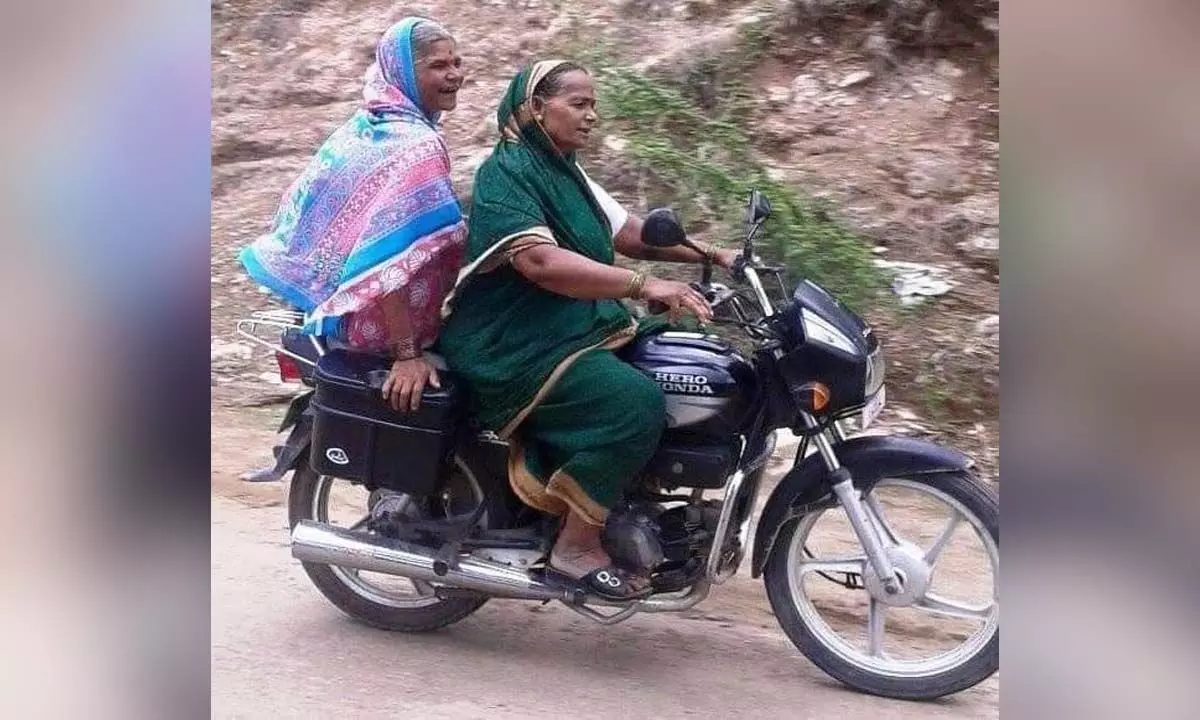Live
- India Faces Blow as Pacer Mohammed Shami Ruled Out for Remainder of Australia Series
- Biden Pardon: Joe Biden Commutes Death Sentences of 37 Inmates, Including Child Killers and Mass Murderers
- South Korea: Yoon believes impeachment trial takes priority over martial law probe
- Strict Action for Non-Adherence to Time Management - DMHO Dr. Swarajya Lakshmi
- Over 13.29 lakh houses approved for rural poor in Maharashtra: Shivraj Chouhan
- District Collector Urges Timely Completion of Indiramma Housing Scheme Survey
- Digital Arrest Scam: Hyderabad Man Duped of ₹7 Lakhs by Fake Crime Branch Police Callers
- Sukhbir Badal seeks President's Police medal for officer who saved his life
- US Firm Accordion Acquires Merilytics, Launches 1,500-Seater Office in Hyderabad
- Free Medical Camp Organized by Alampur Advocate Bar Association
Just In
Madam Sarpanch: Panchayats change profile of women in Maha politics


Exactly 30 years after women’s empowerment got a kick-start with 33 per cent reservations in local self-government bodies, which later went upto 50 per cent
Exactly 30 years after women’s empowerment got a kick-start with 33 per cent reservations in local self-government bodies, which later went upto 50 per cent, the Elected Women Representatives (EWR)s have not only come a long way - but also gone a long way - to consolidate their position as a crucial factor in nation-building from below.
The past three decades have seen the EWRs unshackling themselves from familial and social chains, transforming themselves gradually from being timid, teary-eyed, confused or even some ‘goongigudiyas’ controlled by the menfolk to now becoming assertive, independent, tough, capable of taking their own decisions, and if needed, yell at the man to ‘go to hell’, like veritable Durgas!
Presently, as per the Maharashtra Rural Development Ministry data, there are around 28,000 Gram Panchayats, 352 Panchayat Samitis (taluka level), 14,000 Madam Sarpanches (Madam Presidents), 17 Zilla Parishads (in 35 districts, except Mumbai), and a whopping 125,000 EWRs (of the total 250,000 representatives) in the state, said BhimRaskar, Director, Resource and Support Centre for Development, Navi Mumbai, and Advisor to MahilaRajsattaAndolan.
A prominent grassroots activist in multiple fields, Ulka Mahajan, Founder, Sarvahara Jan Andolan (Raigad), said that there are many movements in the state which helped women’s empowerment, help increase their knowledge, exposure to governance, highlight their abilities and become vocal -- which have played a role to help the women play a more effective role.
“Though the EWRs are now much different from the earlier days, they still have to struggle – with the local bureaucratic mindset, the political elements, lack of transparency and things that are kept hidden from them… This is especially so for the EWRs who are Dalits, Tribals, OBCs, Minorities and they still face discrimination,” rued Mahajan, adding ‘the struggle will continue for long...’
Pratibha Shinde, President of the Lok SangharshMorcha (Jalgaon) said the seeds sown by the then Chief Minister Sharad Pawar have borne fruit and due to the reservations for various categories among the EWRs, “a whole new class of women leaders has emerged”.
“Earlier, 99 per cent of the women in politics hailed from traditional political clans, many functioned under the shadow of the spouse or father who ruled by proxy. But now women boldly come forward from independent, ordinary families to fight and win elections, manage home affairs and administration with aplomb,” said Shinde proudly.
Raskar explained how the RSCD, through MRA, gives training to women, capacity building, hand-holding and mobilising female representatives, and advocacy with the state to ensure necessary policies and support structures are in place.
The trio of Mahajan, Shinde and Raskar are unanimous that with the entry of EWRs, local governance has become ‘more sensitive’ towards soft community issues like water supply, cleanliness, education, better civic infrastructure, etc., rather than “lucrative big-ticket contracts” that the men-folk are obsessed with.
They pointed out that earlier, women were viewed with disdain, deprived of the special Sarpanch Chair and made to sit on an ordinary seat to give them a complex, deprived sections of women were barred from the Panchayat meetings, their orders/instructions were not implemented properly or on priority, and at best, most Panchayat offices worked like branches of the locally dominant political party.
“But all this has changed with EWRs, along with priorities. Now, women consider the welfare of the ‘last man’ in the queue, sympathize with the SC, SC, OBC, Minority groups. Sadly, for this very courageous attitude, the EWRs and women Sarpanches are still ridiculed and face ‘brutal character assassination’, both from men and rival women. This attitude must change,” urged Raskar.
Shinde smiled and recalled a recent instance when some visitors came to a village, and the husband of a ‘Madam Sarpanch’ jumped to volunteer and to show them around so she could complete her domestic chores, “but the woman put her foot down, and threatened to quit if the husband dared to enter the Panchayat office”.
Raskar said that for women to make a better impact, reservations should be accompanied by training in governance, they should be spared of slander by opponents, and with the upcoming 33percent quotas in Lok Sabha and state Assemblies, feels “its high time the local and higher administration take the EWRs more seriously”.

© 2024 Hyderabad Media House Limited/The Hans India. All rights reserved. Powered by hocalwire.com






